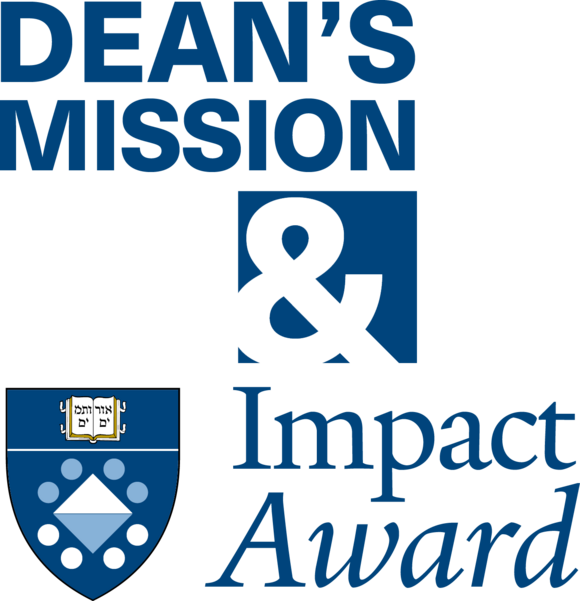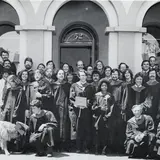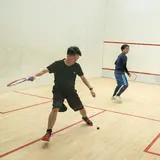
Social Impact Consulting Club Helps New Haven Organizations Navigate Hard Times
Students in the club, one of the inaugural winners of the Dean’s Mission & Impact Award, helped Junta for Progressive Action, the Connecticut Mental Health Center, and other local organizations with management challenges during the COVID-19 pandemic.
By Karen Guzman
In March 2020, Bruni Pizarro watched from her office at New Haven’s Junta for Progressive Action as the world began locking down.
“Everything was unfolding in China, and then in Italy, and I knew it was just a matter of time until it was here,” says Pizarro, executive director of Junta, New Haven’s oldest Latinx-led social services agency, located in the Fair Haven neighborhood.
Pizarro, a 2019 graduate of the Yale School of the Environment, was new on the job and in the midst of working with the City of New Haven to resettle evacuees from recent earthquakes in Puerto Rico. As the COVID-19 pandemic spread, Pizarro knew her organization had to pivot, and quickly.
“We transitioned overnight to remote work,” she says. “It was tough. Our clients kept asking when Junta was going to reopen. But we work with an historically marginalized community that is at high-risk for COVID. A lot of people live in multi-generational housing. We transitioned everything to preserve the safety of staff and the communities we serve.”
In the following months, more adaptation became necessary. In addition to a successful “tele-social services” model, Junta began a diaper delivery service and launched fundraisers to benefit rent and utility assistance programs for clients.
“We’re still adapting,” Pizarro says. “We’re making it work. This era has opened up a lot of opportunities, as well as a lot of new challenges.” Founded in 1969, Junta offers free social, legal, and immigration services, adult education, and youth programs to more than 2,000 people annually.
As the pandemic stretched into the fall, Junta began working with a Yale School of Management student team from the Social Impacting Consulting Club. Every year, students from the club act as pro bono consultants for a variety of local nonprofits and social enterprises.
The challenge at Junta this year was focused, yet comprehensive: how to position the organization’s limited resources for maximum efficiency, in a time when they were most needed. As Pizarro puts it, “This moment calls for rapid change, and we’re now doing community health work. We’re so proud of how resilient Junta has been, tailoring our services to the unique needs of the people we serve.”
The three-member student team first got to work on creating processes to improve staff performance. Junta’s staff fluctuates from 6 to 10 people at any given moment. The students created tools to guide staffing practices, performance evaluations, and goal-setting.
“Having outside input made a big difference,” Pizarro says. “The students were all experienced, compassionate, and totally invested in our mission.”
The spring of 2021 brought a new challenge. Vaccine rates were lagging among some of Junta’s client neighbors, most notably in Fair Haven. Junta has now partnered with the City of New Haven’s department of public health to offer pop-up clinics this summer.
Trevor Shorb ’22 was part of the Junta student team. “This has been my favorite experience at Yale SOM because I feel such an urgency to help solve the very real problems these organizations are facing,” Shorb says.
“By working with Junta, I gained a better understanding of New Haven, applied what I was learning in the classroom, and identified skills necessary to be effective in the social impact space.”
These same goals inspire scores of Yale SOM students to join the club every year, and it’s the spirit that made the club one of the winners of the 2021 Dean’s Mission & Impact Award, which recognizes students from the graduating class whose actions exemplify the school’s mission to educate leaders for business and society.
“I deeply value getting to learn from the Elm City and enriching the community,” says Ethan Boswell ’22. “This year I worked with The Word, a literary arts program for young BIPOC residents of New Haven. The mission really resonates with me due to my own experience with the cathartic power of poetry.”
As a club co-leader, Boswell helps recruit nonprofit clients. “I also help facilitate incoming, first-year MBA students onboarding to the club and match them to a case team,” he says. “Students who self-select into the Social Impact Consulting Club are all people who care about improving the welfare of others, and I’ve wholeheartedly enjoyed getting to know them.”
Like the organizations it worked with this year, the club had to pivot its operations, taking its consulting services virtual. “I think we were able to provide invaluable support to many local organizations, in some cases without ever meeting our clients in person,” says Ashlyn Anderson ’22, who consulted with the Connecticut Mental Health Center (CMHC.)
“We established excellent relationships with our contacts and gave successful presentations to their leadership—all over Zoom,” Anderson says. She worked with the CMHC on a project investigating community mental health needs in a pandemic.
“It made a real impression on me personally,” she says. “I think about mental healthcare differently now, and I understand how much work there is to do to remove the stigma, to empower people in the system with lived experience with mental health conditions, and to address the social issues that contribute to mental health.”
Over the last year, CMHC continued in-person services as well as starting telehealth services, says Kyle Pedersen, director of the CMHC Foundation, which supports the center’s operations. During the pandemic, the foundation mobilized volunteers to make masks for clients, provided clothing, sleeping bags, tents and other resources for homeless people, and secured tablets and Wi-Fi access for CMHC’s deaf and hard-of-hearing clients.
A four-student team was already working with Pedersen prior to the pandemic, focusing on HIPAA-compliant text messaging software to improve communication with patients. That team completed its work in May 2020; in the fall, a new four-student team tackled task-sharing and innovative strategies to improve community mental health.
“Especially in the pandemic, our focus was on keeping people safe and healthy,” Pedersen says. The student team helped identify new pathways for CMHC to engage with its New Haven neighbors.
“Their findings were that we should start by developing more intentional relationships with community leaders in the Hill North neighborhood where CMHC is located,” Pedersen says.
“All the consultation, and the resources they provided, are now helping us think through some of the issues. Every year, students bring this outsider perspective that we always find particularly helpful.”
Anderson says the club’s mission during the upcoming academic year will be more important than ever.
“Last year we were working with organizations during the thick of the pandemic,” she says. “I see this next year as an opportunity to help all kinds of organizations bring more energy and creativity to their missions after a trying, and for many people, a really isolating, year.”
Understanding New Haven and its history and getting to know the community beyond Yale has become both a prerequisite and a benefit for club members, Anderson says.
“I mean it when I say that Social Impact Club was my favorite part of the first year of business school,” she explains. “I learned so much about New Haven—the different neighborhoods, the history, the legacy of Yale, and the local organizations and artistic scene that make this such a vibrant place.”

The Social Impact Consulting Club was one of the inaugural winners of the Dean's Mission & Impact Award. “These students demonstrated that rigorous thinking paired with genuine concern can have positive impact,” wrote Dean Kerwin K. Charles.



